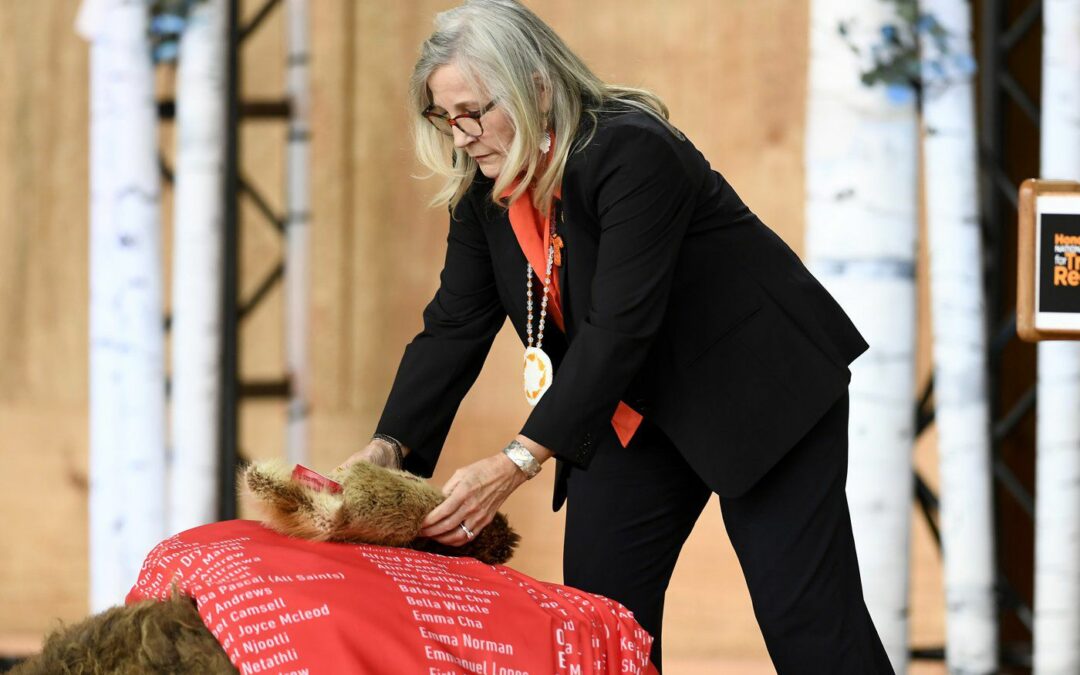By Julia Peterson, Local Journalism Initiative Reporter
Marie Wilson remembers the beginning of the Truth and Reconciliation commission’s work, more than a decade ago.
“We had to get going quickly, because survivors were — rightly — losing hope that anything was ever going to happen,” she said. “So we had to get ourselves out there.”
Early in the process, she recalls many discussions about witnessing the future — what it would mean to truly hear, understand and care for survivors’ stories during the course of the commission and beyond.
“Witnessing the history of Indian Residential Schools in this country, and what needs to be done to address the legacy of them, is not just something for and about Indigenous people,” she said. “As a country, this chapter of our history belongs to all its citizens.
“We all own our past, just as we will all own its future.”
For that reason — and because there was so much work to do, and so few years to start doing it — the TRC also included honorary witnesses. These were people from Indigenous and non-Indigenous communities in Canada, as well as from the international community.
“We know that our country sometimes pays more attention when the rest of the world is watching us than we do if we think we can get away with things just among ourselves, behind closed doors,” Wilson reflected.
On Tuesday, at the eighth and final Wîcihitowin Indigenous Engagement Conference in Saskatoon, Wilson spoke about the ongoing importance of bearing witness to the realities of residential schools, the sixties scoop, and the legacy of colonial violence and injustice in Canada — and to the possibility of repair and a just future.
“We are the future,” she said. “The future is here. It is the only day we can count on. We don’t know the first thing about tomorrow, and we can’t count on tomorrow for the day we’re going to get around to doing something important and great.
“The future is today, and we are witnessing it, and we are living it.”
And, she said, bearing witness to survivors’ stories is only becoming more important as time passes, and fewer survivors are able to keep telling their own stories as they lived them.
At the conference, as she began her keynote speech, Wilson asked the survivors in the room to stand or make themselves known. Then she asked the second-generation survivors, the children of those who had been at residential schools, to do the same.
In the room, the second-generation survivors outnumbered the survivors.
Wilson also talked about what it means to be a witness — that doing so is “not a spectator sport,” but only the start of an ongoing, living commitment.
“We know what an honour it is to be asked to witness a wedding, a baptism, a traditional naming ceremony or a memorial service,” she said. “Through witnessing, the event is validated, made legitimate by honoured and respected guests who bear witness to it.
“We also consider these times and events sacred in our lives. They call for more than our momentary physical presence. They call on us to remember and act.”
(Top Photo: Marie Wilson, former commissioner of the Truth and Reconciliation Commission, places a bundle of beaver skin on the ceremonial cloth with the names of 2,800 children who died in residential schools and were identified in the National Student Memorial Register, during the Honouring National Day for Truth and Reconciliation ceremony in Gatineau, Quebec on Monday, Sept. 30, 2019. Justin Tang/The Canadian Press.)
